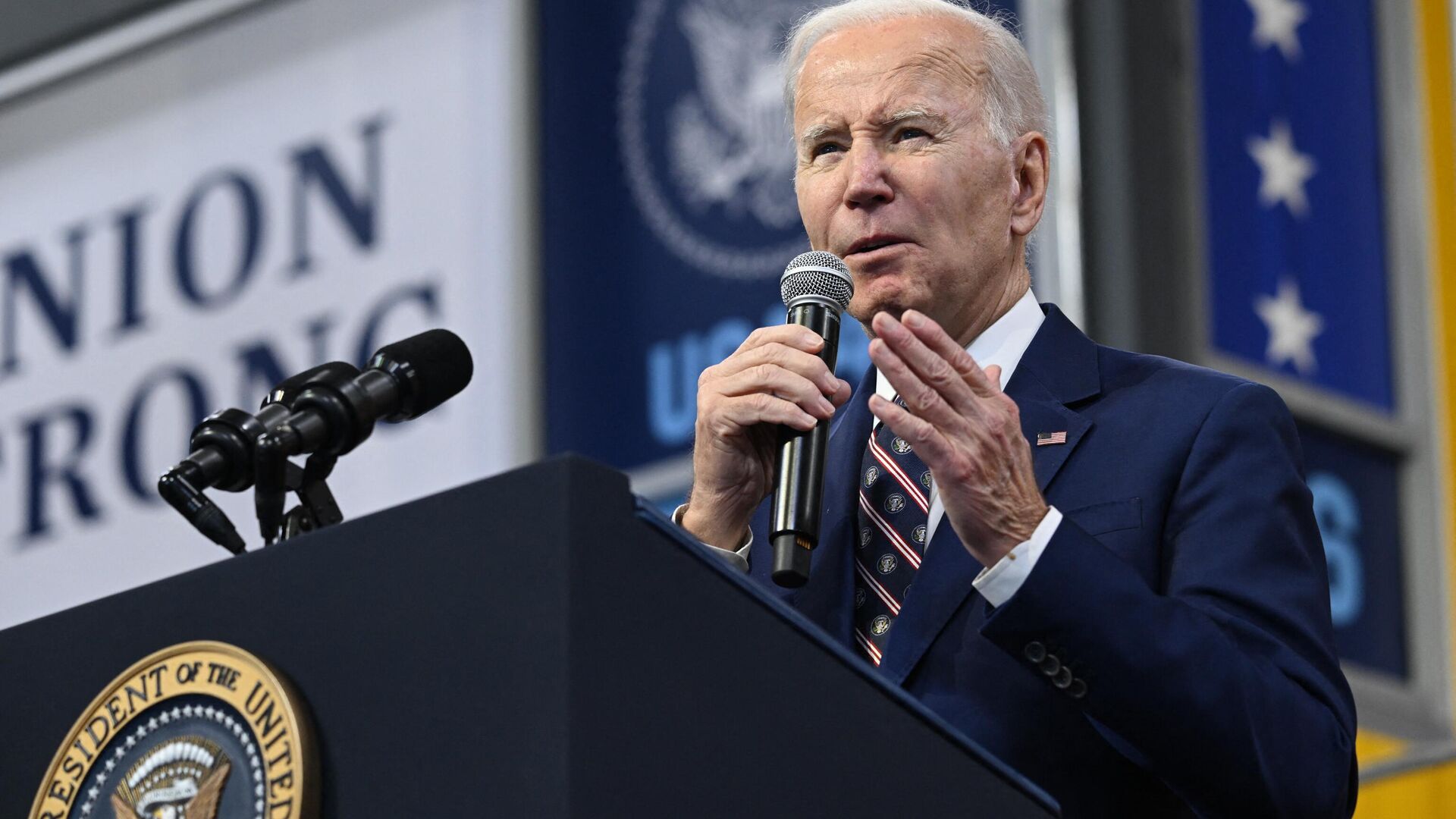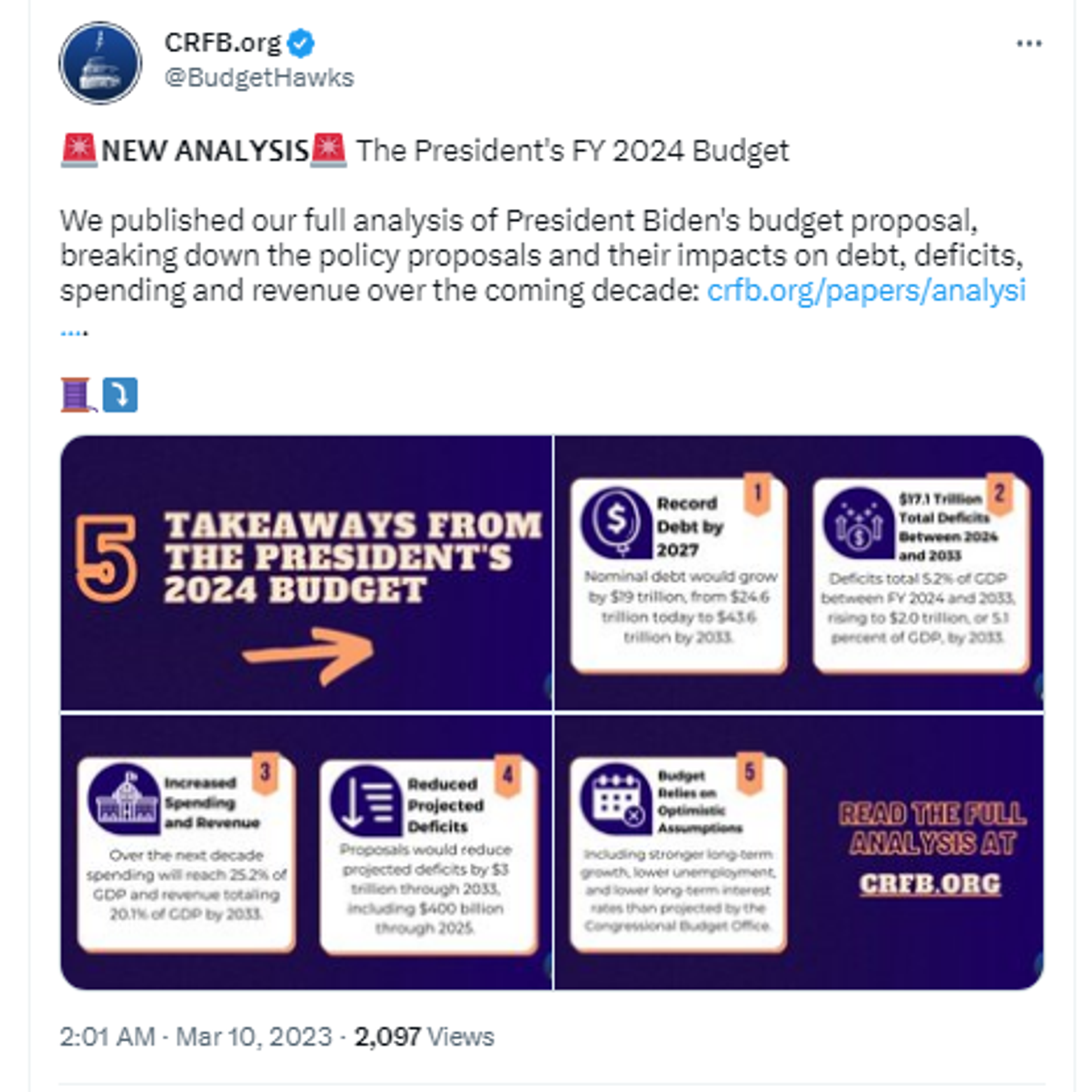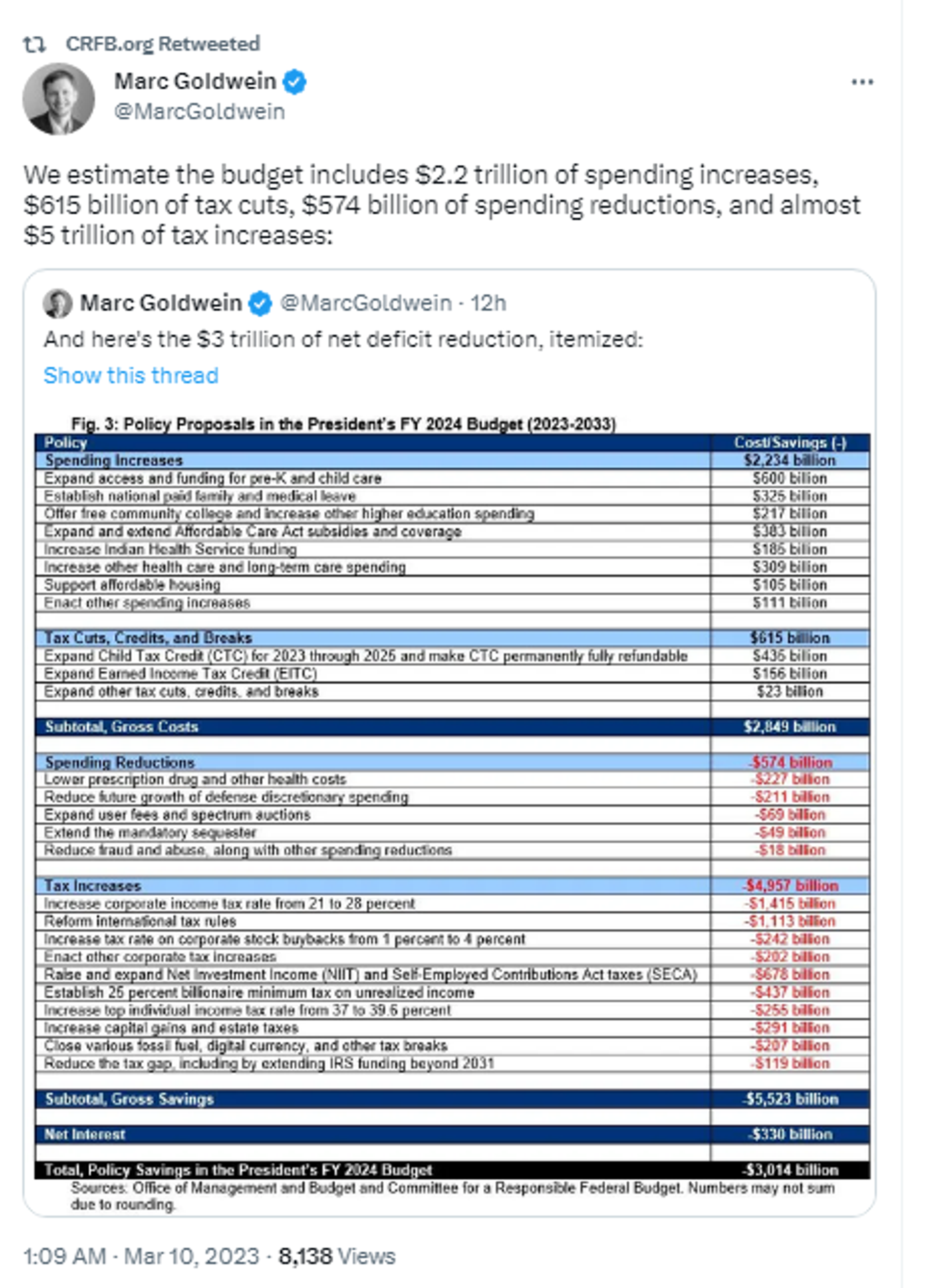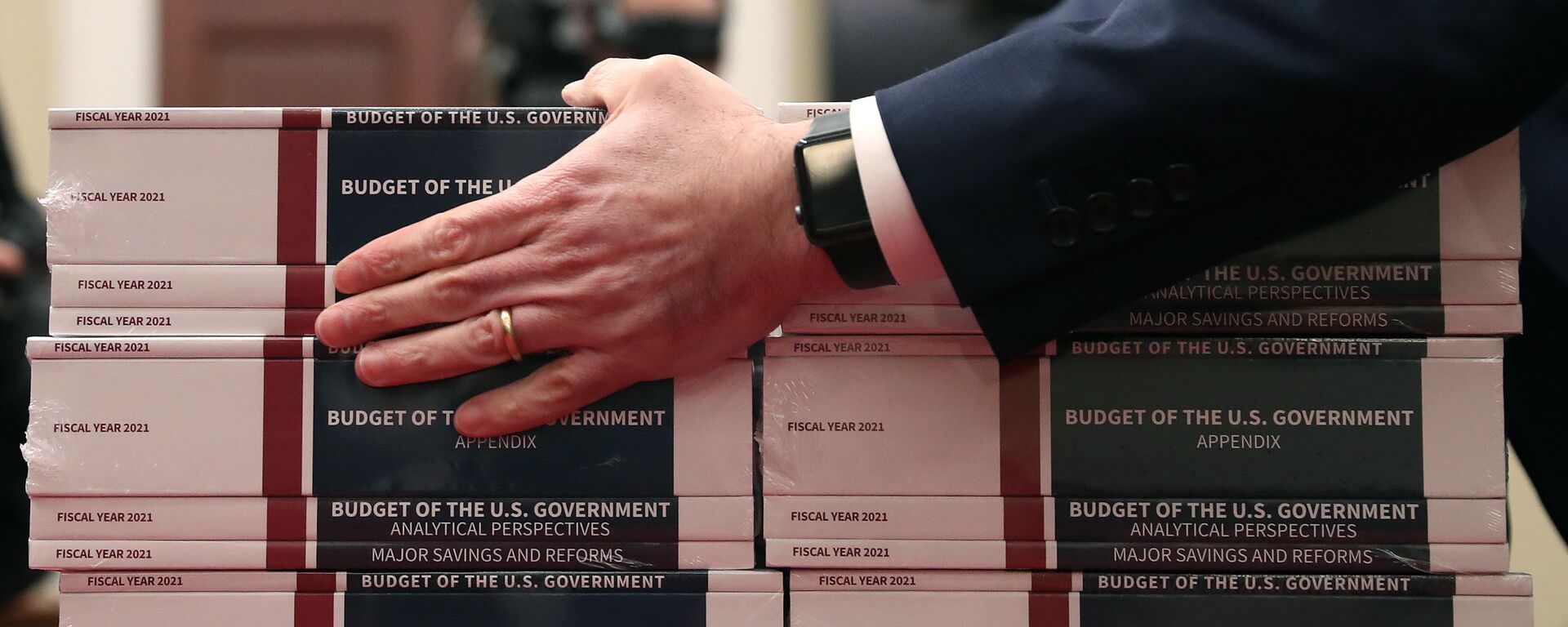https://sputnikglobe.com/20230310/bidens-proposed-2024-budget-will-prompt-national-debt-to-balloon-nearly-twofold-watchdog-warns-1108251071.html
Biden's Proposed 2024 Budget Will Prompt National Debt to Balloon Nearly Twofold, Watchdog Warns
Biden's Proposed 2024 Budget Will Prompt National Debt to Balloon Nearly Twofold, Watchdog Warns
Sputnik International
President Joe Biden’s proposed 2024 budget will prompt national debt to balloon nearly twofold, CRFB, watchdog warns.
2023-03-10T11:55+0000
2023-03-10T11:55+0000
2023-03-10T11:55+0000
americas
us
joe biden
budget
state debt
deficit
budget deficit
https://cdn1.img.sputnikglobe.com/img/07e7/03/0a/1108250662_0:160:3073:1888_1920x0_80_0_0_f3c7b7ee4d65f475272fcd160d599d25.jpg
US President Joe Biden may have touted his proposed fiscal year 2024 budget as including new taxes on wealthy Americans and big corporations, however, a watchdog has warned that the "disappointing" policy would cause the country’s national debt to explode.Nominal debt would nearly double, growing from $24.6 trillion to $43.6 trillion over the next decade as a result of Biden's fiscal proposals, according to an analysis offered by the Committee for a Responsible Federal Budget (CRFB). The CRFB clarified that this would be the outcome of the national debt surging from 98 percent of GDP at the end of 2023 to reach 106 percent by 2027. Looking even further ahead, the debt could be expected to reach 110 percent of GDP by 2033, irrespective of efforts to achieve deficit reduction."Debt under the President’s budget would grow to a new record as a share of the economy over the next decade," the CRFB wrote in its analysis.The deficit would also grow $17 trillion in that span as spending would reach 25.2% of GDP while revenue would top out at 20.1% by 2033. These figures eclipse the 50-year historical spending average of 21.0% of GDP and the revenue average of 17.4%, the CRFB report noted, adding:Elsewhere in the CRFB analysis, the watchdog noted that the 46th president "deserves credit for putting forward $3 trillion of deficit reduction, which could be an achievable near-term bipartisan goal in upcoming negotiations. However, deficit reduction will ultimately need to be nearly three times that large."The report yet again used the word "disappointing," underscoring that the 2024 budget has been injected with many costly proposals without "first putting the nation’s fiscal house in order." The White House Office of Management and Budget on Thursday published its proposed federal government budget for fiscal year 2024, which Congress will be required to subsequently debate, edit, and approve. Biden's 2024 budget proposal includes some $6.9 trillion in spending, with a $1.8 trillion deficit. The policy proposal includes $842 billion set aside for the Department of Defense - a 3.2% increase over 2023 levels.Earlier, the Democratic president hinted he would make a move to introduce new tax hikes on the wealthiest Americans and largest corporations designed to close much of the deficit over the next decade, amounting to some $2 trillion in new revenues. "No one earning less than $400,000 per year will pay a penny in new taxes," Biden said in remarks released with the budget.On March 9, Biden defended his budget, touting it as tailored "for the middle class."
https://sputnikglobe.com/20230309/biden-releases-2024-budget-1108226935.html
https://sputnikglobe.com/20230309/financial-expert-denounces-bidens-claimed-deficit-reducing-budget-as-empty-sloganeering-1108233784.html
americas
Sputnik International
feedback@sputniknews.com
+74956456601
MIA „Rossiya Segodnya“
2023
News
en_EN
Sputnik International
feedback@sputniknews.com
+74956456601
MIA „Rossiya Segodnya“
Sputnik International
feedback@sputniknews.com
+74956456601
MIA „Rossiya Segodnya“
national debt, nominal debt, us nominal debt under president’s budget, analysis by committee for a responsible federal budget, crfb, joe biden budget proposal for 2024 fiscal year, new taxes on wealthy americans and big corporations, a watchdog warned, budget proposal will explode country’s national debt, nominal debt would nearly double, from $24.6 trillion to $43.6 trillion, over the next decade, s budget falls well short, deficit reduction needed, neglects social security,
national debt, nominal debt, us nominal debt under president’s budget, analysis by committee for a responsible federal budget, crfb, joe biden budget proposal for 2024 fiscal year, new taxes on wealthy americans and big corporations, a watchdog warned, budget proposal will explode country’s national debt, nominal debt would nearly double, from $24.6 trillion to $43.6 trillion, over the next decade, s budget falls well short, deficit reduction needed, neglects social security,
Biden's Proposed 2024 Budget Will Prompt National Debt to Balloon Nearly Twofold, Watchdog Warns
After US President Joe Biden proposed the budget for fiscal year 2024 on March 9, including some $6.9 trillion in spending, with a $1.8 trillion deficit, the Committee for a Responsible Federal Budget (CRFB) published its analysis of the policy proposals, modeling their impact over the coming decade.
US President Joe Biden may have touted his
proposed fiscal year 2024 budget as including new taxes on wealthy Americans and big corporations, however, a watchdog has warned that the "disappointing" policy would cause the country’s national debt to explode.
Nominal debt would nearly double, growing from $24.6 trillion to $43.6 trillion over the next decade as a result of Biden's fiscal proposals, according to an analysis offered by the Committee for a Responsible Federal Budget (CRFB). The CRFB clarified that this would be the outcome of the national debt surging from 98 percent of GDP at the end of 2023 to reach 106 percent by 2027. Looking even further ahead, the debt could be expected to reach 110 percent of GDP by 2033, irrespective of efforts to achieve deficit reduction.
"Debt under the President’s budget would grow to a new record as a share of the economy over the next decade," the CRFB wrote in its analysis.
The deficit would also grow $17 trillion in that span as spending would reach 25.2% of GDP while revenue would top out at 20.1% by 2033. These figures eclipse the 50-year historical spending average of 21.0% of GDP and the revenue average of 17.4%, the CRFB report noted, adding:
"This budget falls well short of the deficit reduction needed to put the nation on a sustainable fiscal path. We are disappointed that the spending cuts in this budget – given the massive spending growth in recent years – amount to less than 1 percent of the budget and are coupled by four times as much in spending increases. We are pleased the budget begins to address Medicare but extremely disappointed it neglects Social Security, putting seniors’ benefits at risk."
Elsewhere in the CRFB analysis, the watchdog noted that the 46th president "deserves credit for putting forward $3 trillion of deficit reduction, which could be an achievable near-term bipartisan goal in upcoming negotiations. However, deficit reduction will ultimately need to be nearly three times that large."
The report yet again used the word "disappointing," underscoring that the 2024 budget has been injected with many costly proposals without "first putting the nation’s fiscal house in order."
The White House Office of Management and Budget on Thursday published its proposed federal government budget for fiscal year 2024, which Congress will be required to subsequently debate, edit, and approve. Biden's 2024 budget proposal includes some
$6.9 trillion in spending, with a $1.8 trillion deficit. The policy proposal includes
$842 billion set aside for the Department of Defense -
a 3.2% increase over 2023 levels.
Earlier, the Democratic president hinted he would make a move to
introduce new tax hikes on the wealthiest Americans and largest corporations designed to close much of the deficit over the next decade, amounting to some $2 trillion in new revenues.
"No one earning less than $400,000 per year will pay a penny in new taxes," Biden said in
remarks released with the budget.
On March 9, Biden defended his budget, touting it as tailored "for the middle class."
"With my budget, we can reduce child poverty and increase child opportunity... To support working parents, my budget expands access to affordable, high-quality child care for millions of families. And it invests in paid family and medical leave, so we will no longer be the only major economy without national paid leave," POTUS insisted.






